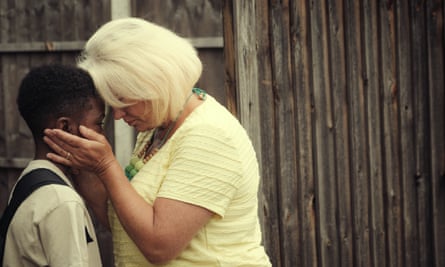Writer-director Shola Amoo’s “semi-autobiographical” second feature is an affecting coming-of-age tale pitched somewhere between the sublime American poetry of Barry Jenkins’s Moonlight and the streetwise British grit of Noel Clarke and Menhaj Huda’s Kidulthood movies. A huge leap forward from the experimental collages of 2016’s A Moving Image (which Amoo has accurately called a “feature-length, multimedia, visual-art project”), The Last Tree bristles with film-making confidence, plunging us into the world of its young protagonist as he struggles to find his place in a strangely changing environment. Powerful performances, tactile visuals and an elegantly fluid score add to the impact of this impressively understated yet profoundly moving tale.
We open in Lincolnshire, with a scene of bucolic beauty reminiscent of the dreamy field-of-corn sequence in Lynne Ramsay’s Ratcatcher. Here, 11-year-old Femi (Tai Golding), a British boy of Nigerian heritage, lives with his English foster mother Mary (Denise Black). It’s an apparently idyllic existence, characterised by afternoons of exuberant mud-splattered play in the sun-dappled glow of the east coast countryside.
All of this is brought to an abrupt end by the arrival of Femi’s birth mother Yinka (Gbemisola Ikumelo), who says she is ready to take her son “home”. Despite Mary’s promise that “she’s not going to take you away”, Femi soon finds himself transported to the high-rise flats of south London, where the phosphorescent glare of urban existence replaces the honeydew haze of his former life. It’s a jolting change, to which Femi reacts with a heartbreaking mix of anguished insularity and barely contained anger and confusion. When Yinka, who is not averse to beating her child, scoldingly tells him that “I didn’t raise you to be rude”, his reply cuts to the quick: “You didn’t raise me.”

Fast-forward to the teenage Femi, now played by Sam Adewunmi, negotiating a complex path between school studies and street life. Like bullied, blue-haired, fellow student Tope (Ruthxjiah Bellenea), for whom he carries a torch, Femi doesn’t quite fit in, tuning in to the chiming sounds of the Cure on his headphones while assuring his friends Dean (Rasaq Kukoyi) and Tayo (Jayden Jean-Paul-Denis) that he’s listening to Tupac – a lovely detail. When local hood Mace (Demmy Ladipo) begins circling Femi, another possible life-path opens up before him, and his studies start to falter. Meanwhile, schoolteacher Mr Williams (Nicholas Pinnock, in a role that owes a debt to Sidney Poitier’s Mr Thackeray from To Sir, With Love) recognises the conflict in Femi’s life, and attempts to break through the barriers that this intelligent but troubled pupil is building round himself.
Watching The Last Tree for the second time, I thought I detected echoes of Chris Doyle’s shimmering work for Wong Kar-wai in director of photography Stil Williams’s terrifically expressive cinematography. Widescreen, hand-held closeups and the regular use of slow-mo place us inside Femi’s experience, with the super-saturated colours of those early Lincolnshire scenes contrasting with the starker hues of London life and the emotional melee of a late-in-the-day trip to Lagos. Each location has its own distinct personality but everything is filtered through Femi’s changing frame of mind. There are visual nods to the iconic final scene of Truffaut’s Les Quatre Cents Coups and a sly invocation of Spike Lee’s trademark “gliding walk” dolly shots, but such references feel organic rather than intrusive.
Sound design plays a crucial role, too, with Femi’s fractured worldview dramatised through a richly textured mosaic of noise that slips from closeup voices and amplified ambient creaks to muffled booms giving the impression of being submerged underwater. It’s as if we can hear the blood rushing in Femi’s ears as he wrestles with self-definition, reminding us of Mahershala Ali’s haunting refrain from Moonlight: “At some point, you gotta decide for yourself who you’re gonna be.”
Completing the picture is a spellbinding score from Segun Akinola that perfectly captures the tonal shifts of the drama – from the rapturous warmth and tenderness of a romantically remembered youth to the almost science fiction-inflected alienation of urban teenage angst. Having previously collaborated with Amoo on A Moving Image and the Shakespeare Lives short film Dear Mister Shakespeare, Akinola (best known to some for his work on Doctor Who) is clearly completely in tune with the director, getting under the skin of his story and striking just the right note of internalised anguish and ecstasy that defines this tender, heartfelt and clearly very personal movie.

Comments (…)
Sign in or create your Guardian account to join the discussion